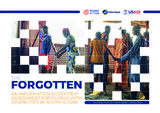The Forgotten: An Information Ecosystem Assessment for People with Disabilities in South Sudan

View/
Date
2023-03Author
Ndavula, John O.
Gbinzaramba, E.
Dau, A. D.
Gubay, M.
Tusiime, W. T.
Beremauro, R.
Murumba, S.
Metadata
Show full item recordAbstract
Decades of conflict in South Sudan pre-and post-independence in 2011, poverty and poor access to services have increased the rate of disability and rendered People with Disabilities more marginalised and excluded because of the many attitudinal, environmental, and institutional barriers they face. The situation is worsened by lack of concerted efforts- at a policy level- to include them in socio-economic and political processes. There is a paucity of information detailing the experiences of People with Disabilities living in South Sudan as truly little research has looked at disability in the country. Despite their unique needs and specific vulnerabilities, these are often submerged under the category of ‘most vulnerable’. Organisations working with and representing People with Disabilities are often absent from humanitarian programming and the needs of People with Disabilities are thus not included in response action. To ensure that Internews’ Rooted in Trust 2.0 (RiT 2.0) Information Ecosystem Assessments (IEAs) are inclusive of People with Disabilities, this study assessed access to information and information flows among People with Disabilities in Central Equatoria and Northern Bahr ElGhazal states in South Sudan.
The study utilised the IEA approach, which explores both the supply side and the demand side of the information ecosystem. The principles of the IEA methodology employed in this mini-IEA included a human-centred research design and a participatory approach. A qualitative approach was used to explore personal and social experiences, meanings, and practices of People with Disabilities in Central Equatoria and Northern Bahr El-Ghazal states in South Sudan. The IEA was conducted through purposive sampling comprising 13 key informant interviews (KIIs), six focus group discussions (FGDs), and desk research. Desk research was conducted between November 2022 and December 2022. Data from KIIs and FGDs was collected from December 2022 to January 2023 in Central Equatoria and Northern Bahr El-Ghazal states in South Sudan. The data was transcribed and analysed thematically. The themes studied focused on information consumption, habits, health, and preferences, as well as beliefs about the reliability of information from diverse sources.
